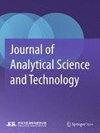小分子衍生物作为polo样激酶-1的polo-box结构域抑制剂的合成和评价
IF 2.8
4区 化学
Q3 CHEMISTRY, ANALYTICAL
引用次数: 0
摘要
polo样激酶1 (Plk1)是一种重要的有丝分裂蛋白。特别是,这种蛋白在许多类型的肿瘤中高度过表达,并已被确定为肿瘤治疗和诊断的潜在生物标志物。Plk1由两个结构域组成,一个n端激酶结构域和一个c端polo-box结构域(PBD)。目前,对Plk1具有更高选择性和特异性的抑制剂是不可用的。因此,我们旨在开发一种针对仅存在于Plk1中的c端PBD的抑制剂。本研究通过蛋白-蛋白相互作用设计了三种靶向PBD的Plk1衍生物,对Plk1 PBD表现出高水平的选择性和特异性,并通过肿瘤细胞分裂过程中的凋亡过程来抑制肿瘤细胞增殖。对这些抑制剂的体内外抗肿瘤作用的研究表明,其中一种新的小分子1是一种很有前途的抗癌药物。我们的发现可以为未来设计新的Plk1肽抑制剂提供新的见解。本文章由计算机程序翻译,如有差异,请以英文原文为准。
Synthesis and evaluation of small molecule-based derivatives as inhibitors of polo-box domain of polo-like kinase-1
Polo-like kinase 1 (Plk1) is an important mitotic protein. In particular, this protein is highly overexpressed in many types of tumors and has been identified as a potential biomarker for the treatment and diagnosis of tumors. Plk1 is composed of two domains, an N-terminal kinase domain and a C-terminal polo-box domain (PBD). Presently, inhibitors with improved selectivity and specificity for Plk1 are unavailable. Therefore, we aimed to develop an inhibitor targeting the C-terminal PBD present only in Plk1. In this study, three derivatives targeting PBD for Plk1 were designed by protein–protein interactions, which showed high levels of selectivity and specificity for Plk1 PBD, and were evaluated to inhibit tumor cell proliferation through an apoptotic process during tumor cell division. The investigation of the in vitro and in vivo antitumor effects of these inhibitors demonstrated that one of the new small molecules, 1, is a promising anticancer agent. Our findings can provide new insights for the design of novel Plk1 peptide inhibitors in the future.
求助全文
通过发布文献求助,成功后即可免费获取论文全文。
去求助
来源期刊

Journal of Analytical Science and Technology
Environmental Science-General Environmental Science
CiteScore
4.00
自引率
4.20%
发文量
39
审稿时长
13 weeks
期刊介绍:
The Journal of Analytical Science and Technology (JAST) is a fully open access peer-reviewed scientific journal published under the brand SpringerOpen. JAST was launched by Korea Basic Science Institute in 2010. JAST publishes original research and review articles on all aspects of analytical principles, techniques, methods, procedures, and equipment. JAST’s vision is to be an internationally influential and widely read analytical science journal. Our mission is to inform and stimulate researchers to make significant professional achievements in science. We aim to provide scientists, researchers, and students worldwide with unlimited access to the latest advances of the analytical sciences.
 求助内容:
求助内容: 应助结果提醒方式:
应助结果提醒方式:


